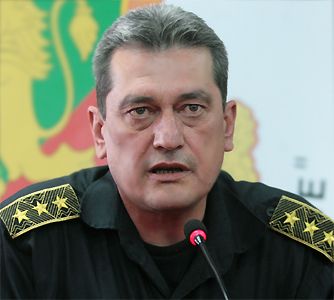Almost every day there are reports about fires. Disasters such as fires, storms, hurricanes, tornadoes and floods are seen more frequently throughout south eastern Europe. Speaking of fires, it should be pointed out that Bulgaria is quite vulnerable. What has been causing frequent fires? What is the situation in Bulgarian forests? We sought answers to these and other questions from Chief Commissioner Nikolay Nikolov, head of the Fire Safety and Population Protection Department.
 “Fires in recent months have mostly affected forests and fields. The main reasons include high summer temperatures, low humidity and strong winds. Unfortunately, more than 98 percent of fires are caused by human activity and most often this happens because of negligence despite our appeals to citizens to be more careful, especially during the summer season, when all activities related to lighting fires in fields and near forests are strictly forbidden. Since the beginning of 2016 the teams of Fire Safety and Population Protection has been involved in fighting a total of 20,321 fires. 201 of them were forest fires. 77 people lost their lives and 181 citizens were injured,” Chief Commissioner Nikolov says.
“Fires in recent months have mostly affected forests and fields. The main reasons include high summer temperatures, low humidity and strong winds. Unfortunately, more than 98 percent of fires are caused by human activity and most often this happens because of negligence despite our appeals to citizens to be more careful, especially during the summer season, when all activities related to lighting fires in fields and near forests are strictly forbidden. Since the beginning of 2016 the teams of Fire Safety and Population Protection has been involved in fighting a total of 20,321 fires. 201 of them were forest fires. 77 people lost their lives and 181 citizens were injured,” Chief Commissioner Nikolov says.
Well-trained professionals serve in Bulgarian fire departments and several hundred million euros have already been invested in the purchase of equipment for fighting forest fires. But the problem remains the lack of fire-fighting aircraft, so firefighters actively cooperate with the Bulgarian Air Force. The mobilization of structures of the Ministry of Defence, police and gendarmerie is also often required. In some cases the services of volunteers are also used. There is also a traditionally good cooperation with neighbouring countries and the Mediterranean countries.
Commissioner Nikolov assessed positively the changes in the Law on Disaster Protection:
"Bulgaria currently has Unified Rescue System, which pays special attention to timely response and prevention. It took more than a year for a highly qualified team to analyse the situation and propose the best solutions. We got acquainted with the best practices of Europe, USA, and Australia. Under the new law prevention comes first, followed by planning, preparation, response and recovery. The pride of our team is that the law coincided with 90 percent of the proposals we received from the European Commission, which assessed our work on the spot. Naturally, all this is in direct relation to the UN climate change conferences in Sendai (Japan) and in Paris.”
English: Alexander Markov
Timișoara, a large multicultural city in western Romania, is the center of the historical community of the Banat Bulgarians . The members of this community are descendants of settlers from the Bulgarian lands nearly three centuries ago, who have..
In Gabrovo – a city in the geographical center of Bulgaria, once described as the Bulgarian Manchester, but today facing demographic challenges – there are young people who believe that the future can be better and that this largely..
For 15 years, Stela Nedkova has been living in Brussels . After completing her education in Bulgaria, she decided to test herself in a different reality to see whether she could handle life’s challenges on her own, without her parents’ help. Stela faced..

+359 2 9336 661
